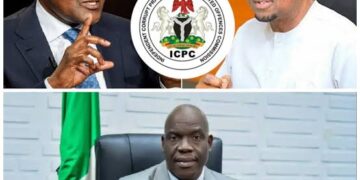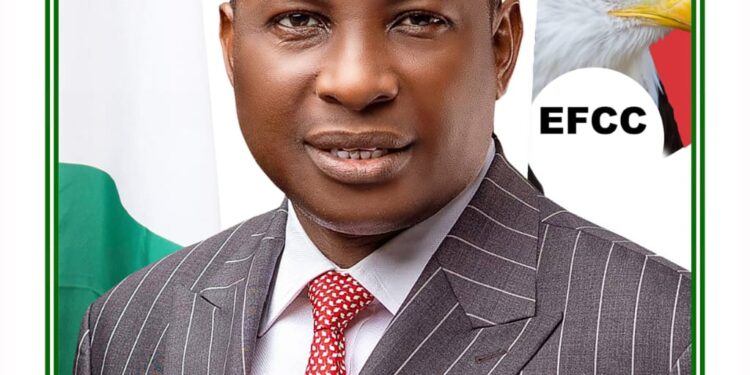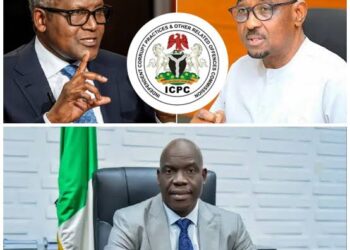The Chairman of the Economic and Financial Crimes Commission (EFCC), Mr. Ola Olukoyede, has disclosed that the agency is currently investigating 18 serving governors across Nigeria.
Speaking in Lagos on Friday during the EFCC’s campaign against naira abuse, Olukoyede stated that the Commission has adopted a proactive approach by initiating investigations even before governors complete their tenures.
According to him, “there was a case of a Nigerian governor who travelled the second day he handed over to the United Kingdom to celebrate his birthday. As he was in the hotel celebrating with his friends and spraying £50 bill, the hotel waiter called 911, thinking he was mad. And by the time Metropolitan Police got there, he was arrested. But two of his fellow governors who were there pleaded that he was not mad and he was handed over to the EFCC. He was prosecuted and jailed but was later pardoned. You could see that even the British did not allow people to spray or stamp their currency,“ he added.
On addressing the abuse of the naira, Olukoyede stressed its symbolic importance to national identity. “The naira is not only a means of exchange, but it’s also our sovereignty,” he said.
Continuing, he stated, “People claim that naira spray is part of our culture and customs. Assuming that without conceding that it’s true, I think culture and customs must add value to us and evolve the way our lifestyle evolved. There’s nothing cultural about spraying and stamping of naira. The EFCC is mandated to enforce all naira abuse. The Commission will be failing in its operation by succumbing to such blackmail. We must all lend our voices to restore the integrity of our naira because it’s our sovereignty.”
Olukoyede noted that two key programmes under President Bola Tinubu’s Renewed Hope Agenda—NELFUND and the Credit Programme—have already benefited from funds recovered from financial crimes. So far, ₦50 billion has been committed to NELFUND.
He also disclosed that recovered funds from the Niger Delta Development Commission (NDDC) were used to build a skills acquisition centre and the Commission’s headquarters in Yenagoa, Bayelsa State, which was recently commissioned.
In a significant example of asset recovery, Olukoyede mentioned that the EFCC had taken possession of a private university, now renamed the University of Applied Sciences, Kashia Kaduna. The institution was allegedly built with ₦12 billion diverted by a former civil service director. “The university is one of the best private universities we have around,” he added.
On illicit cryptocurrency activities, Olukoyede revealed that 194 foreigners were arrested in Lagos for illegal operations, and 168 of them have already been convicted. “As of yesterday, 168 of the foreigners have been convicted,” he said.
He emphasized the EFCC’s commitment to cleansing Nigeria’s economic landscape. “We are ready to clean our economic sector to make it attractive to foreign investors. Yahoo Yahoo and other associated crimes have done a lot of reputation damage to us. At a time, Nigerian passports could enter 12 developed countries without a visa. But today, the international passports of Cameroon and Ghana are better than us.”
Highlighting the challenges of prosecuting high-profile cases, Olukoyede shared: “Do you know what it takes to prosecute ex-governors? We received calls from high and mighty. At times, we have to relocate from our homes. We are constantly under pressure.”
He noted that over 5,000 corruption cases were filed in the past year alone, with more than 65% involving civil servants and politically exposed individuals. He cited a case involving a former governor that took 11 years to navigate interlocutory injunctions before the Supreme Court ruled the case could proceed. “More than 65% of the cases we filed last year were on civil servants, politically exposed persons,” he said.
To prevent further financial misappropriation, Olukoyede said the EFCC has set up a fraud risk assessment unit, which has prevented the theft of ₦10 billion within a year. He also noted the Commission’s public awareness efforts through its anti-corruption radio station, 97.3 FM.
Echoing Olukoyede’s concerns, the Director General of the National Orientation Agency (NOA), Mallam Lanre Isa Onilu, emphasized the ethical and civic implications of naira abuse. “For civic responsibility and national cohesion, we must ensure that we treat our naira in a dignified manner. The National Values Charter also dwells on how to curb the abuse of naira. We have our television commercials running on some stations to sensitise Nigerians about this,” he said.



































